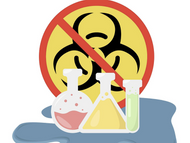Why Chemical RV Holding Tank Treatments Are Banned in Many States (2025 Update)
Posted by Happy Campers Store on Jul 5th 2025
Why Chemical RV Holding Tank Treatments Are Banned in Many States (2025 Update)
If you're an RVer who cares about your health, the environment, and even staying legal in your travels, it's important to understand why chemical RV holding tank treatments are being banned in more and more states. In this post, we'll break down exactly what these treatments are, which ingredients are restricted, which states ban them, and what you can use instead.
What Are "Chemical" RV Holding Tank Treatments?
So-called "chemical" treatments typically contain powerful biocides and disinfectants. For decades, formaldehyde-based formulas were the industry standard. They worked by killing all bacteria in the tank to suppress odors. But that also made them toxic—both to the environment and to sewage treatment facilities.
While some brands have removed formaldehyde, many still rely on similar harsh chemicals. Common problematic ingredients include:
- Formaldehyde
- Glutaraldehyde
- Bronopol
- Para-dichlorobenzene
Why Do States Ban These Ingredients?
Formaldehyde and related chemicals are effective at killing bacteria, but that's the problem: they don't just kill odor-causing bacteria in your tank, they also disrupt municipal and campground septic systems when you dump. They prevent the natural breakdown of waste in these systems, leading to costly failures and contamination.
Health authorities also consider formaldehyde a known human carcinogen. Exposure to fumes can cause respiratory irritation, allergic reactions, and long-term health risks.
Which States Ban Formaldehyde and Related Chemicals?
Several U.S. states and regions restrict or outright ban RV holding tank treatments containing formaldehyde or similar chemicals. Examples include:
- California (strict consumer product labeling laws, Proposition 65)
- Washington
- Oregon
- Massachusetts
- New York (some campground bans)
- Many private campgrounds nationwide refuse dumping of formaldehyde-treated tanks
This trend is growing as municipalities discover the cost of disrupted septic and sewage systems. More campgrounds than ever now specify "No formaldehyde" in their rules.
What Happens If You Use a Banned Treatment?
If you're camping in a state or campground that prohibits formaldehyde-based treatments, you may be refused access to dump stations or asked to use alternative treatments before dumping. In some areas, using banned chemicals can even result in fines or ejection from campgrounds.
Beyond that, there's the environmental responsibility: dumping formaldehyde kills beneficial bacteria needed to process waste safely. It's not just about regulations—it's about protecting the land and water we all enjoy.
How to Check If Your RV Tank Treatment is Chemical-Based
Not all treatments advertise their contents clearly. Look for any of these red flags on the label:
- "Kills bacteria" claims
- Formaldehyde, glutaraldehyde, bronopol, or other biocides in the ingredient list
- Heavy, perfume-based scent (often used to cover up chemical odors)
If in doubt, research the product or choose a treatment marketed as "formaldehyde-free" or "chemical-free" and check it truly avoids these banned compounds.
What Are Safer Alternatives?
Campers today have better choices. Enzyme and mineral-based RV holding tank treatments control odors without toxic chemicals:
- Enzyme-based treatments: Use naturally occurring bacteria and enzymes to break down waste and control odors. However, they may lose effectiveness in extreme heat (above 90°F).
- Mineral-based treatments: Use mineral and micronutrient blends to control bacteria balance, neutralize odors, and work even in very high temperatures. These are an excellent choice for summer travel and hot climates.
At Happy Campers, we specialize in mineral-based RV tank treatments designed to outperform chemicals without harming septic systems or the environment.
Why Choose Mineral-Based RV Holding Tank Treatments?
Mineral treatments like Happy Campers Holding Tank Treatment deliver:
- Effective odor control in hot weather
- No formaldehyde or harsh chemicals
- Septic-safe and campground-friendly formulas
- Proven customer satisfaction (over 15,000 Amazon reviews with 4.8 stars)
Switching to a mineral-based treatment means peace of mind that you're keeping your RV, your family, and the environment safer.
Recommended Reading
- Enzyme vs Mineral RV Holding Tank Treatments: Which is Better?
- Why Enzyme RV Holding Tank Treatments Fail in Hot Weather
- Enzyme vs Chemical RV Holding Tank Treatments: Which is Safer and More Effective?
Important Note for California RVers
While Happy Campers contains no formaldehyde, glutaraldehyde, bronopol, or other banned biocides, California's SB-317 labeling rules restrict its sale there due to broad definitions of “non-biodegradable” chemicals. Always check local regulations to ensure your RV tank treatment complies with state requirements.
Conclusion
Regulations banning formaldehyde and other harsh chemicals in RV holding tank treatments exist for good reason: these chemicals harm people, damage septic systems, and pollute the environment. By switching to safer alternatives like mineral-based treatments, you’re not only avoiding fines or campground bans—you’re making RV life better for everyone.
Ready to make the switch? Check out Happy Campers Holding Tank Treatment today and travel with confidence, no matter where you roam.


